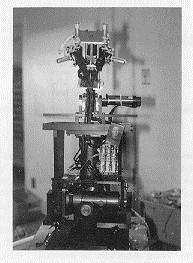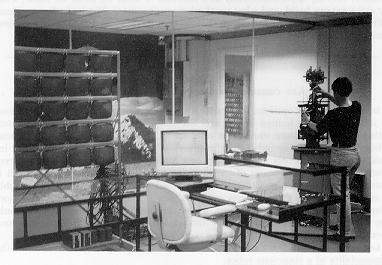
presented at the Royal Society meeting, Artificial Intelligence and the Mind, April 13-14, 1994. Published in Philosophical Transactions of the Royal Society, A, 349, 1994, 133-46.
Arguments about whether a robot could ever be conscious have been conducted up to now in the factually impoverished arena of what is possible "in principle." A team at MIT of which I am a part is now embarking on a longterm project to design and build a humanoid robot, Cog, whose cognitive talents will include speech, eye-coordinated manipulation of objects, and a host of self-protective, self-regulatory and self-exploring activities. The aim of the project is not to make a conscious robot, but to make a robot that can interact with human beings in a robust and versatile manner in real time, take care of itself, and tell its designers things about itself that would otherwise be extremely difficult if not impossible to determine by examination. Many of the details of Cog's "neural" organization will parallel what is known (or presumed known) about their counterparts in the human brain, but the intended realism of Cog as a model is relatively coarse-grained, varying opportunistically as a function of what we think we know, what we think we can build, and what we think doesn't matter. Much of what we think will of course prove to be mistaken; that is one advantage of real experiments over thought experiments.
keywords: consciousness, robot, artificial intelligence 

1. ARE CONSCIOUS ROBOTS POSSIBLE "IN PRINCIPLE"?
It is unlikely, in my opinion, that anyone will ever make a robot that is conscious in just the way we human beings are. Presumably that prediction is less interesting than the reasons one might offer for it. They might be deep--conscious robots are in some way "impossible in principle"--or they might be trivial--for instance, conscious robots might simply cost too much to make. Nobody will ever synthesize a gall bladder out of atoms of the requisite elements, but I think it is uncontroversial that a gall bladder is nevertheless "just" a stupendous assembly of such atoms. Might a conscious robot be "just" a stupendous assembly of more elementary artifacts--silicon chips, wires, tiny motors and cameras--or would any such assembly, of whatever size and sophistication, have to leave out some special ingredient that is requisite for consciousness?
(The whole paper is now available in Daniel Dennett, Brainchildren, Essays on Designing Minds, MIT Press and Penguin, 1998.)